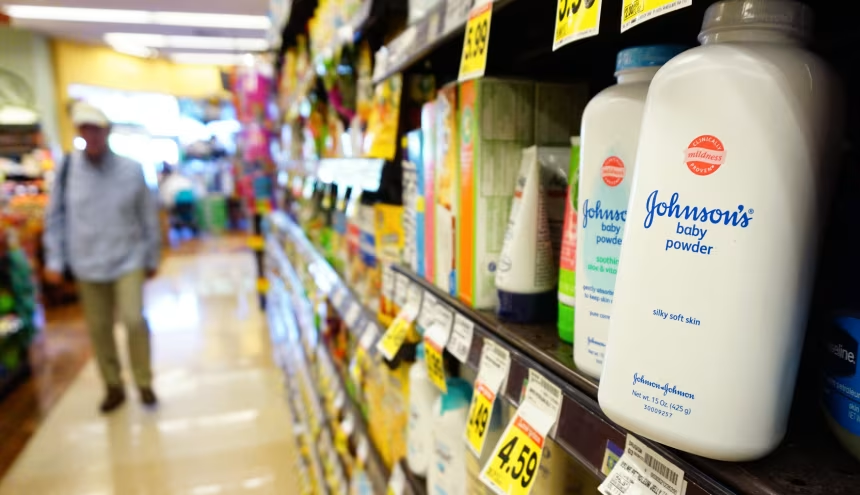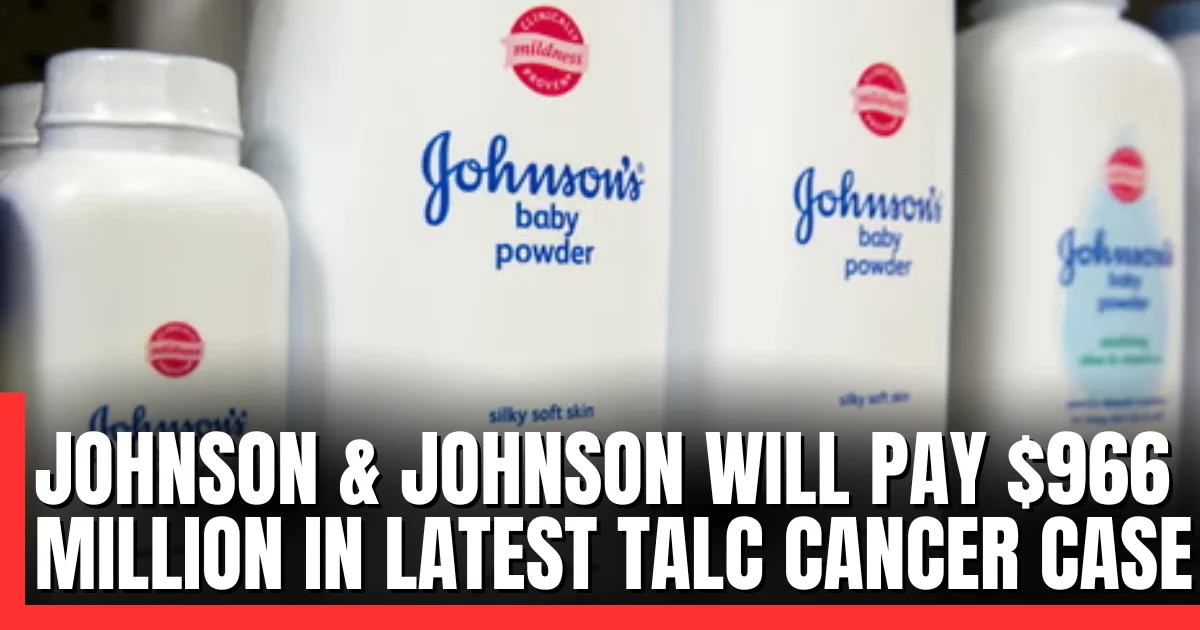A Los Angeles jury orders Johnson & Johnson to pay $966 million in a major talc cancer case. Learn the details and what it means for future lawsuits.
Table of Contents
Johnson & Johnson Ordered to Pay $966 Million in Latest Talc Cancer Case
Introduction
In a landmark decision, a Los Angeles jury has ordered Johnson & Johnson (J&J) to pay $966 million to the family of Mae Moore, a California woman who died from mesothelioma, a rare cancer linked to asbestos exposure. This verdict marks one of the largest awards yet in the ongoing talc baby powder lawsuits against the healthcare giant.
The case underscores the growing legal and financial risks facing Johnson & Johnson, which continues to battle tens of thousands of similar claims alleging that its talc products caused cancer.

Jury Finds Johnson & Johnson Liable in Mesothelioma Death
The California jury found Johnson & Johnson liable for selling talc-based baby powder products containing asbestos, concluding they played a direct role in causing Moore’s fatal cancer.
- Compensatory damages: $16 million
- Punitive damages: $950 million
The punitive damages are meant to punish J&J for alleged misconduct, though the amount could be reduced on appeal. The U.S. Supreme Court has previously ruled that punitive awards should typically not exceed nine times the compensatory amount.
J&J Plans Immediate Appeal, Calls Verdict “Unconstitutional”
Erik Haas, J&J’s worldwide vice president of litigation, said the company would immediately appeal the verdict, describing it as “egregious and unconstitutional.”
“The plaintiff lawyers in this case relied on junk science that should never have been presented to the jury,” Haas said.
Johnson & Johnson maintains that its talc products are safe, contain no asbestos, and do not cause cancer. The company stopped selling talc-based baby powder in the U.S. in 2020, switching instead to a cornstarch formula.

Thousands of Talc Cancer Lawsuits Still Pending
J&J currently faces over 67,000 lawsuits from individuals claiming their use of talc-based products led to cancer diagnoses. While many of these cases involve ovarian cancer, a smaller subset — like Moore’s — involves mesothelioma claims.
The company’s repeated attempts to settle the lawsuits through bankruptcy have been rejected by federal courts. Without a national settlement, J&J continues to face state-by-state trials.
Recent verdicts have varied, with some juries ruling in favor of the company. For example:
- In South Carolina, J&J was found not liable last week.
- In Oregon, a judge threw out a $260 million verdict and ordered a new trial.
However, Monday’s decision in California remains one of the largest talc-related judgments in recent memory.
Legal Experts Warn of Mounting Liability Risks
Legal analysts believe the $966 million verdict could encourage other plaintiffs to pursue larger settlements.
With thousands of cases pending, the potential financial exposure for Johnson & Johnson could reach into tens of billions of dollars if future juries deliver similar verdicts.
“This verdict sends a clear message that corporate accountability still matters,” said Trey Branham, attorney for Moore’s family.
For investors, the case highlights a growing risk in corporate liability litigation, especially for consumer health companies with long product histories.
What Comes Next for Johnson & Johnson
J&J is expected to appeal the California verdict, potentially seeking to reduce the damages or overturn the ruling entirely. The company has been successful in lowering or reversing some previous awards on appeal.
Still, this latest case reinforces the legal and reputational challenges J&J faces as it works to resolve thousands of lawsuits related to its talc products.
❓FAQs
Q1: Why is Johnson & Johnson facing so many talc lawsuits?
A: Thousands of plaintiffs claim J&J’s talc-based baby powder contained asbestos, a known carcinogen, leading to cancer diagnoses like mesothelioma and ovarian cancer.
Q2: What is mesothelioma and how is it caused?
A: Mesothelioma is a rare, aggressive cancer typically caused by inhaling asbestos fibers, often found in industrial or contaminated consumer products.
Q3: Can Johnson & Johnson appeal the $966 million verdict?
A: Yes. J&J has stated it will appeal the decision, arguing that the evidence used against it was flawed and unconstitutional.
Q4: Has J&J stopped selling talc-based baby powder?
A: Yes. Johnson & Johnson discontinued talc-based baby powder sales in the U.S. in 2020 and switched to a cornstarch-based version.
Q5: How many J&J talc lawsuits are still pending?
A: More than 67,000 cases are active in U.S. courts, with most involving claims of ovarian cancer linked to talc exposure.
🏁 Conclusion
The $966 million Johnson & Johnson verdict marks another major chapter in the company’s long-running legal saga over talc-related cancer claims. While J&J vows to appeal, the growing wave of litigation signals that the controversy is far from over.
💬 What’s your view? Should large corporations face heavier penalties for product safety issues? Share your thoughts in the comments.

